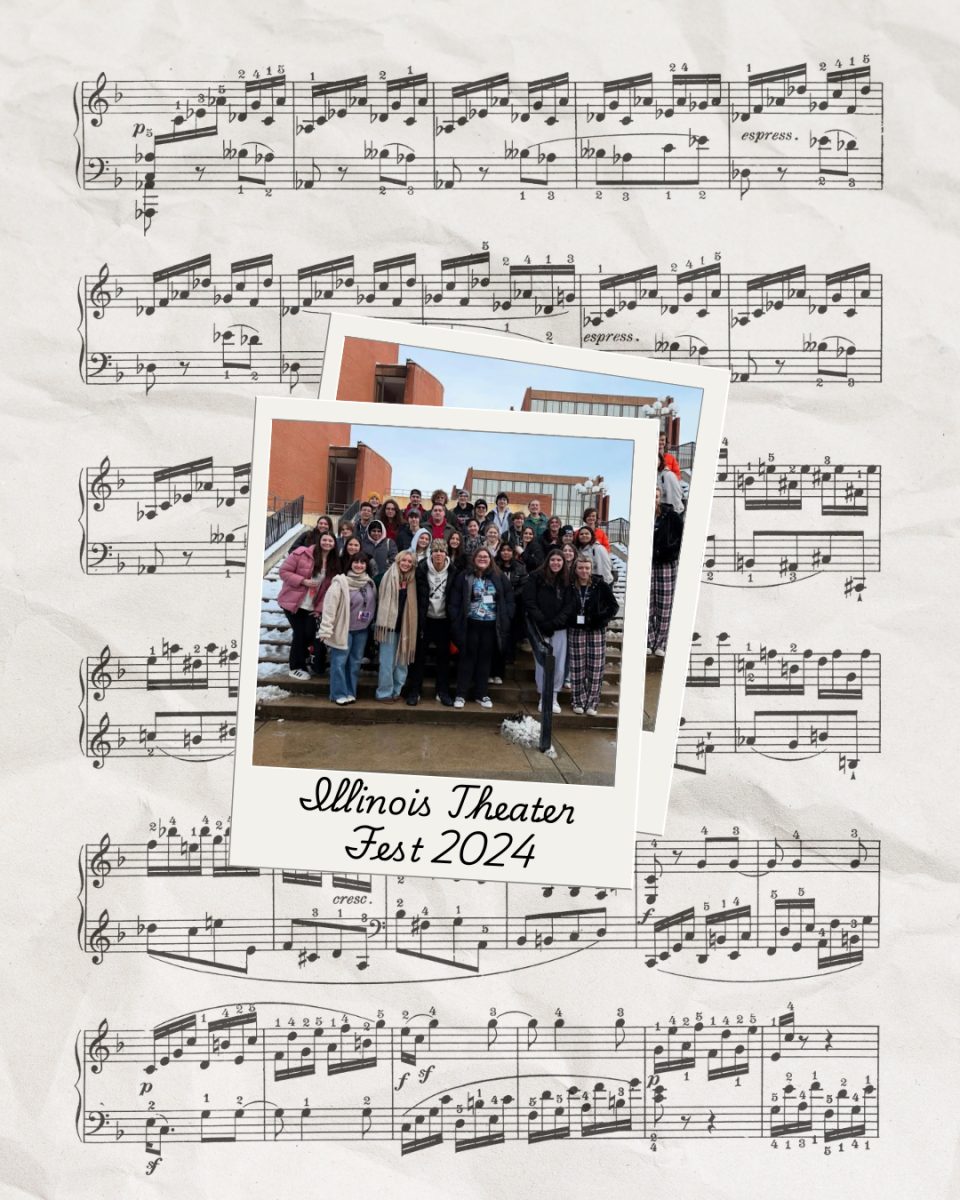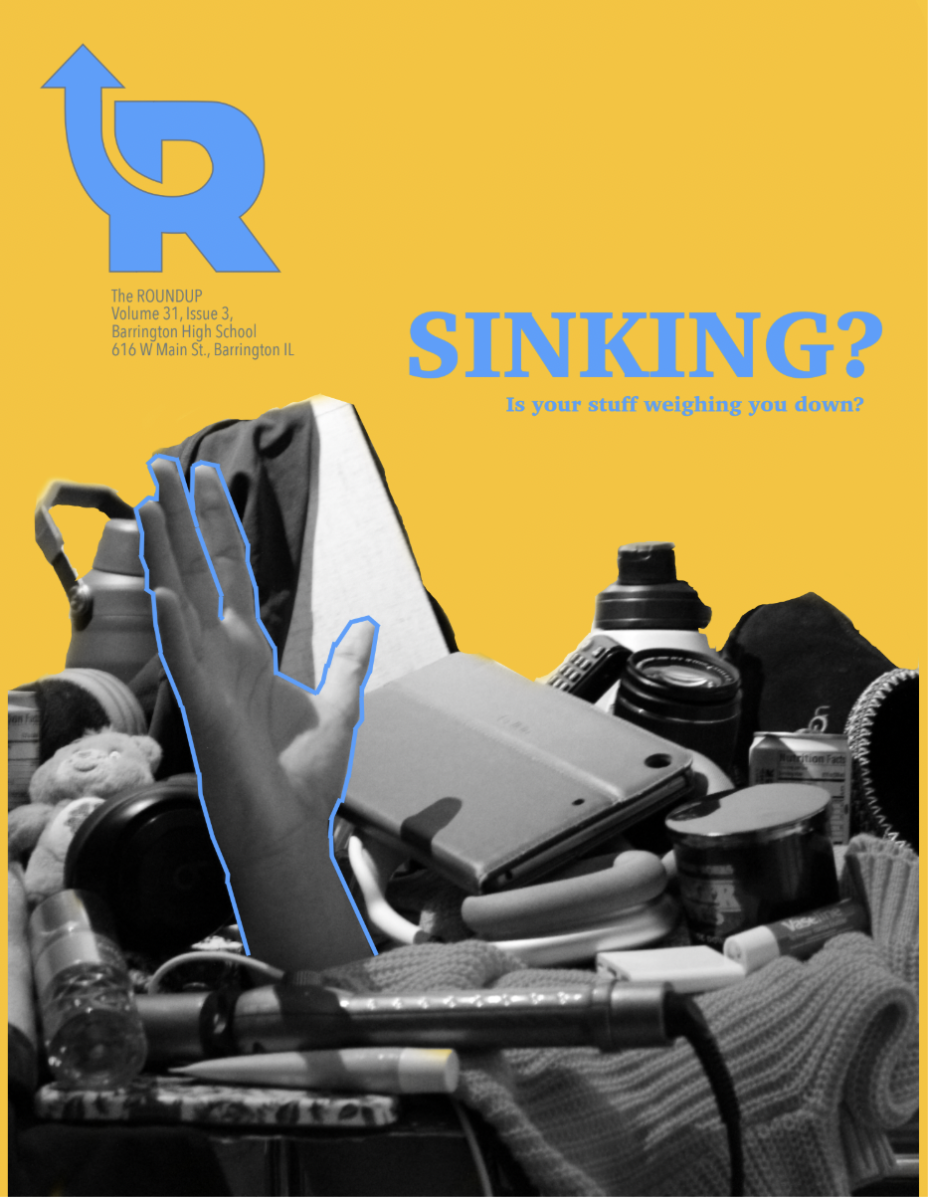At what cost?
AP Student
While the rest of her family slept, junior Adaobi Ibe sat on her bedroom floor in the center of dimly lit academic chaos. She had a Chromebook in her lap, her iPad and her Advanced Placement (AP) Biology textbook strewn around her.
Her test was tomorrow. Her study guide was half done.
“I was just flipping through the pages. I was typing… I was just trying to cram all the information,” Ibe said. “I was so burnt out.”
Ibe’s story is not unique.
AP classes are one component of the vast academic organization, CollegeBoard. As per CollegeBoard, “AP gives students the chance to tackle college-level work while they’re still in high school.” But, at what cost?
Last year, a total of 2,629 AP exams were taken. If that is the case, CollegeBoard – a nonprofit organization – made over $255,000 off of Barrington High School alone.
While the average college kid takes four classes at a time, Junior Cindy Yang takes the high school equivalent of six.
“I will admit I’m feeling pretty stressed,” Yang said. “My schedule is the busiest it has been. I am getting to bed an hour later than I was freshman year and sleeping in on weekends to catch up on my sleep.”
Ibe has had a similar experience and notes a decline in her current mental health compared to her mental health freshman year. She attributes that disparity to her AP course load.
“Honestly, I still get really worried and anxious that I won’t be able to get my biology grade up. There’s just a lot of stress behind that,” Ibe said.
AP School
AP classes allow students the opportunity to partake in college-level work as high schoolers. AP Biology teacher Laura Turngren describes how science is more so application and reasoning than it is a conceptual understanding of material. Such high-level thinking skills are highlighted in the format of the AP Biology Exam which consists of both a multiple choice and free response section.
“I feel like by having both of those formats, it kind of gives students the opportunity to not just explain their conceptual level of understanding but also be able to apply it to new stimuli and new novel scenarios that they haven’t seen before,” Turngren said.
Despite the advantages, marriage to the extensive curriculum outlined by AP can limit instructive liberty and curtail student explorations of subjects that interest them.
“A lot of our students are pursuing medicine and we’re not able to explore human anatomy and physiology because of the requirements that we have to hit in order to prepare them for the AP test,” Turngren said.
Moreover, AP classes serve students in a post-secondary environment. Post High School Counselor, Kate Moody, believes colleges, especially highly selective colleges, look for a high level of high school preparation.
“They’re looking for what they call ‘rigor’ on a student’s transcript,” Moody said. “AP courses are rigorous courses and, in many instances, the most rigorous courses that are offered in high school.”
Colleges considering students for admission identify whether or not that student has been academically challenged in high school, using their palette of AP classes to do so.
AP Cost
The high school pays for CollegeBoard services, including testing administration, testing material (such as exams) and teacher training. The majority of student exam fees go to CollegeBoard, although the school receives a minute amount as they round costs up “by pennies” in order to make transactions easier. As of now, CollegeBoard provides the school with a rebate of just over 1%, which the school uses to pay for CollegeBoard services.
“I think they kind of rob you of your money, I’m gonna be honest. Their outrageous prices for exams, SATs, all that crap – it’s like, why?” Ibe said. “I don’t trust them, but am I still gonna use them? Yeah. That’s how I’m gonna get into college.”
In the case that students do not have the financial means to pay for an exam they would like to take, CollegeBoard states that students with a “significant financial need” may be eligible for a $35 fee reduction per AP Exam. Last school year, just under 8% of students who took AP Exams received fee waivers. The majority of those students qualified for federal fee reduction programs (such as the National School Lunch Program).
If students do not fall under this category but find themselves in an “extenuating circumstance,” Idrizi maintains that the school will aim to assist them regardless.
AP Score
Despite high costs, some students see a financial value in taking an AP class in order to score well on an AP Exam.
“I want to get college credit because I’d rather pay $100 and take an AP test and do well on it than pay a bunch of money to take that class in college,” senior Himat Sidhu said. “I’d rather just get the credit in high school.”
A score of a 4 or a 5 on the AP Biology Exam gives students credits for three hours of college lectures and two hours of college laboratory experiences. Further, Moody recalls students who have entered college as a first semester sophomore, saving those students a year of tuition. Of the 2,629 exams taken last year, 57.4% received scores of either a four or five, making them eligible for credit at most colleges. Idrizi sees value in high AP scores, as well.
“I’m speaking from a mom perspective. If a student receives that college credit, that is saving for the student because they do not have to take those courses in college which, of course, come at a cost,” Idrizi said.
Yang agrees on the basis of price comparison and student savings, but she feels CollegeBoard prices disrupt academic equality.
“I want to be able to help my parents save as much money as they can, especially because I have a younger sister who is most likely going to go to college as well,” Yang said. “However, determinants of success, as set by CollegeBoard, are largely based on economic position. So, while I know I am lucky enough to have parents who are willing to spend money on AP Exams, I know a vast amount of people in the U.S. don’t have the same privileges that I do.”
Alternatively, there exists the possibility of an AP score that will not translate as college credit. Last year, 9.4% of students did not receive scores eligible for credit. That is, regarding college credit, 247 AP Exams gave students nothing.
Sidhu takes five AP level classes. She is taking two AP Exams.
“I feel like the test isn’t really worth it if you end up doing bad on it. If you don’t need the credit, then I would just not take the test,” Sidhu said.
Sidhu, however, believes the experience of AP teaches valuable and applicable skills including time management and prioritization.
Meanwhile, Ibe believes the AP score system, itself, – in which scores determine college credit – can be remedied.
“You might be having a bad day [on the day of the exam] or you just are burnt out. There should be more to it than just getting a 4 or 5. There should be more to determine whether you get that college credit,” Ibe said. “You could get all As throughout the year which I feel like is more significant than just getting a 4 or a 5 on an AP test.”
Why AP?
So, why AP?
“It’s almost like if you can get through to CollegeBoard, you can get to a college,” Ibe said. “They just have too much of a relationship with each other.”
There are other benefits of AP that have little to do with college and savings and ingraining hard work values. Turngren observes that students taking an AP class experience a heightened interest regarding the subject matter of that class.
“I think all students have this natural curiosity about the living world. Taking a class like AP Biology allows them to explore that a little more, even if they’re not pursuing a major in biological science,” Turngren said. “I’ve had students enter this class thinking, ‘I’m not pursuing life science at all’ and then they end up either adding a life science part to their major or changing it entirely.”
AP curricula is multifaceted in its use and its drawbacks.
“The rigor is worth it if you think you can handle it because you’ll learn from it for your future. But, don’t over challenge yourself because a lot of people do that and that’s not what AP is designed for,” Sidhu said. “There is a lot of pressure to take hard classes. Use them to improve yourself, not to torture yourself.”
Weeks after that stressful night spent studying, Ibe eventually dropped one of her AP classes – AP U.S. History – taking the high school level course, instead.
“The class would have hurt my grade and my GPA probably would have suffered tremendously. It was just a lot,” Ibe said. “Dropping that class kind of made me like, you know, have more of a life.”
Your donation will support the student journalists at Barrington High School! Your contribution will allow us to produce our publication and cover our annual website hosting costs.



























































